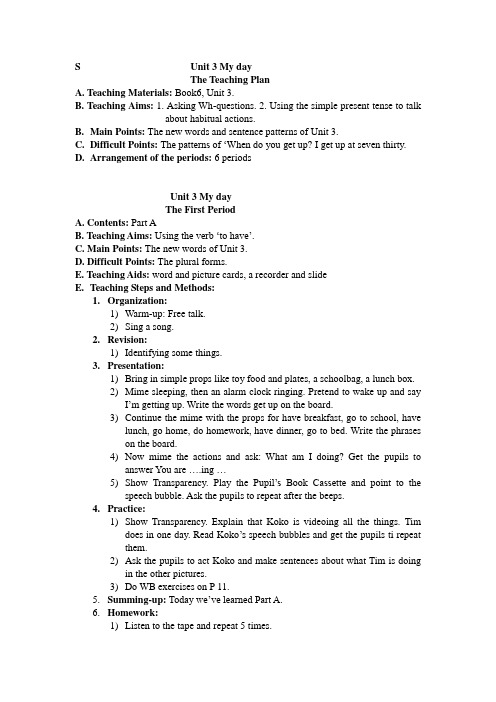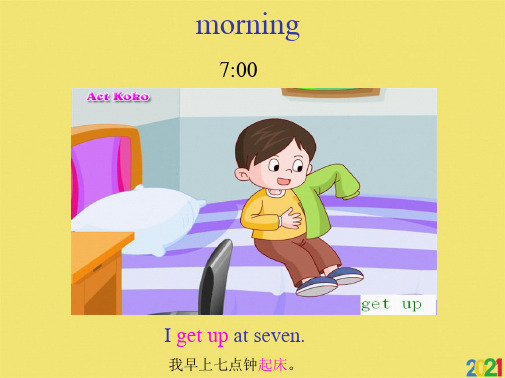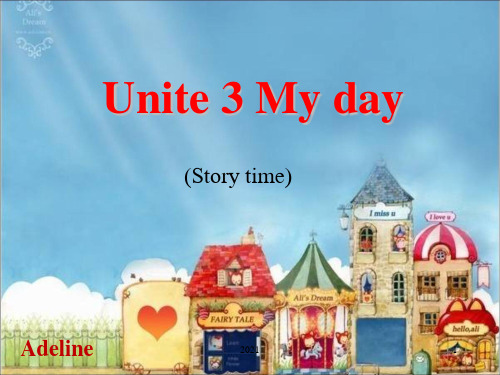三年级下册英语同步讲义 Unit 3 My day 深港朗文版
Book 6 Unit 3 My day 深圳朗文版小学英语

S Unit 3 My dayThe Teaching PlanA. Teaching Materials: Book6, Unit 3.B. Teaching Aims: 1. Asking Wh-questions. 2. Using the simple present tense to talkabout habitual actions.B.Main Points: The new words and sentence patterns of Unit 3.C.Difficult Points: The patterns of ‘When do you get up? I get up at seven thirty.D.Arrangement of the periods: 6 periodsUnit 3 My dayThe First PeriodA. Contents: Part AB. Teaching Aims: Using the verb ‘to have’.C. Main Points: The new words of Unit 3.D. Difficult Points: The plural forms.E. Teaching Aids: word and picture cards, a recorder and slideE.Teaching Steps and Methods:anization:1)Warm-up: Free talk.2)Sing a song.2.Revision:1)Identifying some things.3.Presentation:1)Bring in simple props like toy food and plates, a schoolbag, a lunch box.2)Mime sleeping, then an alarm clock ringing. Pretend to wake up and sayI’m getting up. Write the words get up on the board.3)Continue the mime with the props for have breakfast, go to school, havelunch, go home, do homework, have dinner, go to bed. Write the phraseson the board.4)Now mime the actions and ask: What am I doing? Get the pupils toanswer You are ….ing …5)Show Transparency. Play the Pu pil’s Book Cassette and point to thespeech bubble. Ask the pupils to repeat after the beeps.4.Practice:1)Show Transparency. Explain that Koko is videoing all the things. Timdoes in one day. Read Koko’s speech bubbles and get the pupils ti repeatthem.2)Ask the pupils to act Koko and make sentences about what Tim is doingin the other pictures.3)Do WB exercises on P 11.5.Summing-up: Today we’ve learned Part A.6.Homework:1)Listen to the tape and repeat 5 times.2)Copy the new words 4 times.F.Write on the board:Unit 3 My daybreakfast get up do homeworkhave lunch go to schooldinner go to bed go homeUnit 3 My dayThe Second PeriodA. Contents: Part BB. Teaching Aims: 1. Asking Wh-questions. 2. Using the simple present tense to talk about habitual actions.C. Main Points: The sentence pattern of Unit 3..D. Difficult Points:E. Teaching Aids: word and picture cards, a recorder and slideG.Teaching Steps and Methods:anization:1)Warm-up: Free talk.2)Sing a song.2.Revision:1)Review Part A of Unit 3.3.Presentation:1)Prepare a clock face with hands which move. Bring an alarm clock toclass.2)Revise the numbers 1-12 by using the short hand to point to them askingthe pupils to tell the numbers.3)Make the long hand point to 12 and move the short hand around sayingOne o’clock, two o’clock, etc. Write some of the times in numbers on theboard, e.g.2:00. Get the pupils to join in. Move the hour hand randomlyto test the pupils’ understanding.4)Make the short hand point to 1.Move the long hand to the 3,say onefifteen and write the time on the board, e.g. 1:15. Move the short hand tothe two and repeat. Encourage the pupils to repeat as I go around theclock. Repeat this process with the long hand pointing to the 6, e.g. onethirty, and the 9, e. g. one forty-five.4.Practice:1)Show Transparency and play the Pupil’s Book Cassette. The pupils listenand follow in their books. Continue to play the cassette and ask the pupilsto repeat the words after the beeps.2)Explain that Koko is showing the video of Tim. Get the pupils to act Timand make sentences about his day using the small pictures and clocks atthe top of the page.3)Then show the pupils that Tim asks Pat about her day. Demonstrate howto carry on the conversation with Tim making a sentence about when hedoes something then asking Pat when she does it. Ask the pupils to workin pairs to act the characters on this page.4)Ask the pupils to work in pairs to act Tim and Pat.5)Do WB exercises on P 12.5.Summing-up: Toda y we’ve learned Part B.6.Homework:1)Listen to the tape and repeat 5 times.2)Copy Part B twice.G. Write on the board:Unit 3 My dayWhen do you ___?get up at seven fifteen.have breakfast at seven thirty.I go to school at seven forty-five.have lunch at twelve fifteen.go home at forty-fifteen.do homework at four forty-five.Unit 3 My dayThe Third PeriodA. Contents: Part CB. Teaching Aims: Communicate with others on familiar topics.C. Main Points: The sentence pattern of Unit 3.D. Difficult Points: Retell the story.E. Teaching Aids: word and picture cards, a recorder and slideH.Teaching Steps and Methods:anization:1)Warm-up: Free talk.2)Sing a song.2.Revision:1)Read Part A and B.2)Let the pupils to role-play the stories.3)Show the act.3. Presentation:1)Point to the characters in the pictures and read their speech bubbles aloud.Ask the pupils to point to the speech bubbles as I read them.2)Play the Pupil’s Book Cassette for the pupils and ask them to say thesentences after the cassette.3)Tell the pupils where London is. Explain that the time is seven or eighthours different from China.4)Ask the pupils to role-play the story in pairs and to read the characters’speech bubbles. Some pairs may like to come to the front and act thestory.4. Practice:1) Ask the pupils to role-play the story in groups of three and to read the character’s speech bubbles. Some groups may like to come out to the front and act the story.2) I may use Storycards to revise the sequence and language of the story.3) Do WB exercises on P16.5. Summing-up: Today we’ve learned Part C.6.Homework:1)Listen to the tape and repeat 5 times.2)Do CB exercises.G. Write on the board:Unit 3 My dayWe’re back. I’m tired. Jenny, don’t forget your homework.I’m here. It’s London time. See you at dinnertime.I usually do my homework at five thirty. I’m in bed.Unit 3 My dayThe Fourth PeriodA. Contents: Part D and EB. Teaching Aims: Communicate with others on familiar topics by using simple learned expressions structures.C.Main Points: 1. The sentence pattern of Unit 3. 2. The sound of the words.D.Difficult Points: The sound and the words.E.Teaching Aids: word and picture cards, a recorder and slideF.Teaching Steps and Methods:1. Organization:a)Warm-up: Free talk.b)Sing a song.2. Revision:1)Read Part A, B and C.2)Role-play the stories.3)Show the act.3.Presentation:1)Ask the pupils to read the story again.2)Demonstrate how to draw lines between the people in the pictures and thespeech bubbles using number one as an example.3)Play the Pupil’s Book Cassette and ask the pupils to listen to the soundsand the words. Point out the spelling of this sound.4)Say the words slowly and clearly. Check that the pupils are saying thesounds correctly.4.Practice:1)Point to the pictures and check that the pupils can say the words withoutmy model.2)Play the Pupil’s Book Cassette again. Ask the pupils to circle the coinsand the toys in the picture. Tell the pupils to repeat the rhyme.3)Do WB exercises on P 14.5.Summing-up: Today we’ve learned Part D and E.6.Homework:1)Listen to the tape and repeat 5 times.2)Do CB exercises.G.Write on the board:Unit 3 My daybr[br] br other br eakfastfr[fr] fr iend fr uitUnit 3 My dayThe Fifth PeriodA. Contents: Part FB. Teaching Aims: Communicate with others on familiar topics by using simplelearned expressions structures.C.Main Points: 1. The sentence pattern of Unit 3.D.Difficult Points: Do a partner survey to find out about daily routines.E.Teaching Aids: word and picture cards, a recorder and slideF.Teaching Steps and Methods:1. Organization:1)Warm-up: Free talk.2)Sing a song.2.Revision:1)Read Part A, B, C and E.2)Act out the story of Part C.3. Presentation:1)Tell the pupils they are going to make a schedule of their day. Explain thismeans writing down the times they usually so things. Set the scene by tellingthe pupils to pretend they are staying with an aunt who doesn’t know theirschedule.4. Practice:1)Tell the pupils to work in pairs. Show them the schedule at the bottom of thepage but ask them not to write anything yet. Tell them that pupil A is the aunt.She will ask questions and write down pupil B’s answers in the schedule on the page. Then tell the pupils to change roles, Pupil B will be the aunt and ask questions.2)Do WB exercises.5. Summing-up: Today we’ve learned Part F.6.Homework:1)Listen to the tape and repeat 5 times.2)Prepare for dictation.G.Write on the board:Unit 3 My dayWhen do you get up?I get up at ___.Unit 3 My dayThe Six PeriodA. Contents: Part GB.Teaching Aims: 1. Be able to write the 4-skill words. 2. Be able to grasp thesentence pattern.C.Main Points: Spelling of the 4-skill wordsD.Difficult Points: Spelling of the 4-skill wordsE.Teaching Aids: word and picture cards, a recorder and a sliderF.Teaching Steps and Methods:anization:1)Warm-up: Free talk.2)Sing a song.2.Revision:1)Read Part A, B, C and E.2)Have a dictation.3.Presentation:1)Play the Pupil’s Book Cassette for the pupils to listen to the song.2)Show the pupils the small pictures and where to write the time that theywill hear in each verse.3)Play the cassette again and ask the pupils to write the times they hear foreach activity.4)Play the cassette again for the pupils to check their answers.4.Practice:1)Play the game again and encourage the pupils to join in with the words.2)Do WB exercises on P15.5.Summing-up: Today we’ve learned Part G.6.Homework:1)Listen to the tape and repeat.2)Prepare for the next lesson.G.Write on the blackboard:Unit 3 My dayWhen do you get up?When do you get up?Seven fifteen,Seven fifteen.We get upAt seven fifteen.Notes:。
三年级英语下册《Unit3Myday》课件2深港朗文

•When does Anne go to bed ?
•She goes to bed at_______
• 6:15
•six fifteen •a quarter past six
• back --- be / come back home 回到家
• tired --- be tired / look tired 疲劳/看上去疲
•twelve fifteen •a quarter
•What are they doing ? past twelve
•When does Jane have lunch?
•She has lunch at _______
• go home
• 4:15
•four fifteen •a quarter past four
三年级英语下册《 Unit3Myday》课件2深港
朗文
•Unit3 My day
• get --- get up when
• 7:15
•seven fifteen
•a quarter past seven
•What is Tim doing ?
•He is getting up
•When does Tim get up?
•When does Jack do homework?
•He does homework at _______
•Mar • dinner / suppyer --- have dinner / supper
Hale Waihona Puke • dinnertime 吃饭时间,晚饭时间
•six thirty
• 6:30
•half past six
Chapter2Mydiary语法(课件)新版香港朗文英语三年级下册

: I _m__a_d_e_ (make) some new friends. Too bad it __ra_i_n_e_d_ (rain) __so__ we _d_i_d_n_’t_p_l_a_y_
(not play) any outdoor games.
The End
Acknowledgments
We add ‘ed’ to a lot of action words to form the past tense.
I played the piano yesterday.
How do we ask questions in the simple past tense?
Simple past tense
We are grateful to the following for permission to reproduce copyright photographs:
Sergiy Bykhunenko. Shutterstock for slides 1 & 6 Catalin Petolea. Shutterstock for slides 3 & 4 Gelpi. Shutterstock for slides 3 & 4 Jeka. Shutterstock for slide 6 Franck Boston. Shutterstock for slide 7 Sylvie Bouchard. Shutterstock for slide 7
6. Complete the sentence using ‘so’.
I __w_as__ busy _s_o_I__d_id_n_’t_p_r_a_c_t_is_e_ _t_he__p_ia_n_o_ (practise) .
深港朗文版英语三下《Unit 3 My day》课件

six thirty
five thirty
seven forty six fifteen four forty
four forty
seven forty
six thirty Learning tips
当我们描述非整点的时间时 可以这样说:
时针的数字点数+分针的数字点数
5:30
When do you do homework? I do homework at seven in the evening.
我在晚上7:00做家庭作 业。
evening
7:00
Evening
8:00
• When do you watch TV(看电 视)? • I watch TV at eight.
Have lunch
Play football Go home Do my homework
12:00
4:00 4:40 5:30
Have dinner
Watch TV
6:15
7:00
如果你是Mike ,你能描述Mike的 一天吗?比如:
• Hello, I’m Mike. I___________________at____ __________. • That’s my day.
When do you go to bed? I go to bed at nine thirty.
night
9:30
My timetable(时间表)
Activities
get up go to school
Time 6:00
7:10 A: When do you…? have lunch 11:00 B: I usually… Go home 4:50 /ju:/ Go to bed 9:00
Unit 3 My day(1)

(5)When do you have Chinese class? • (6)When do you eat dinner? •
(7)When do you do homework? •
(8)When do you watch TV? •
(9)When do you go to bed?
•
Unit 3 My day
Unit 3 My day(1)
Unit1 This is my day
Unit 3 My day(1)
• (1)When do you get up? •
(2)when do you eat breakfast? •
(3)When do you go to school? •
• 单词辨音
• (1) A. eat B. breakfast C. meat D. speak
• (2)A. get B. often C. bedroom D. forest
• (3)A. work B. sports C. morning D. visitor
• 2.完成对话
• A: _____________________________________?
• 判断对错 1.Dog usually goes shopping on the weekend.
2.Zoom often plays football on the weekend.
3.Monkey is going to watch TV this weekend.
4.They are going to read story books this weekend.
香港朗文2A Chapter 3 My day

Chapter 3 My dayExpressionsKey Words(核心词汇)1.one一2.two二3.three三4.four 四5.five五6.six六7.seven七8.eight八9.nine九10.ten十11.eleven十一12.twelve十二Extension Words(拓展词汇)1.o’clock整点2.half past………点半3.fifteen 十五4.twenty二十5.twenty-five二十五6.thirty三十7.forty四十8.fifty 五十9.get up 起床10.wash my face 洗脸11.brush my teeth 刷牙12.have breakfast 吃早饭13.go to school 去上学14.do my homework 写作业15.have a shower洗澡16.go to bed 上床睡觉17.nest鸟巢18.flying lesson 飞行课19.take care of…照顾…20.have lunch 吃午饭21.wait等待22.must必须23.idea点子;主意24.timetable时间表25.go hunting去打猎26.Mars火星27.spaceship宇宙飞船28.have dinner吃晚饭29.reply 回复Key Sentences(核心句型)1.Tom , it’s time to get up and wash your face.Tome,起床洗脸的时间到了。
2.What’s the time ? 几点了?3.What time is it ? 几点了?4.It’s seven o’clock/seven fifteen/half past seven.现在七点整/七点十五分/七点三十分。
Extension Sentences(拓展句型)1.Mother Bird takes good care of her babies.鸟妈妈把宝宝们照顾得很好。
三级下册英语课件Unit My day 深港朗文版完美版

afternoon
5:30
I have dinner at five thirty.
我下午五点三十分吃晚饭。
evening
7:00
I do homework at seven.
我傍晚七点钟做作业。
night
9:30
I go to bed at nine thirty.
我晚上九点半睡觉。
1. I get up at seven.(7:00) 2. I have breakfast at seven ten.(7:10) 3. I go to school at seven twenty. (7:20) 4. I have lunch at twelve thirty. (12:30) 5. I go home at four thirty. (4:30) 6. I have dinner at five thirty. (5:30) 7. I do homework at seven. (7:00) 8. I go to bed at nine thirty. (9:30)
I have breakfast at seven ten. I go to school at seven twenty. I get up at seven. I have lunch at twelve thirty. I go to school at seven twenty. I do homework at seven. I go to school at seven twenty. I have dinner at five thirty. I have breakfast at seven ten. 我下午五点三十分吃晚饭。
深港朗文版英语三年级下册 Unit 3 My day同步讲义

深港朗文版英语三年级下册 Unit 3 My day同步讲义前情回顾在正确的时间下打钩what’s the time? It’s seven o’clock / eight o’clokwhat’s the time? It’s ten past ten./eleven ten.what’s the time? It’s seven thirty / eight thirtywhat’s the time? It eleven fifteen / fifty体系搭建知识点1:词汇get up 起床breakfast 早餐lunch 午餐,午饭homework 家庭作业dinner 晚餐when 什么时候,何时back 回(原处),向后tired 疲劳的,累的dinner time 吃饭时间later 晚些的,迟些的usually 通常知识点2:短语go to schoolhave lunchgo homedo homeworkhave dinnergo to bed知识点3:句型When do you get up?I get up at six fortyWhen you have breakfast?I have breakfast at seven o’clockWhen do you go home?I go home at five in the afternoon典例分析例题1:根据首字母填空1,I have b at seven o’clock2,I u go to school at eight3,I have two l in the afternoon4, It’s time g to school5, I do my h at five例题2:词组翻译1,上学2,回家3,做作业4,睡觉5,吃午餐6,吃晚餐例题3:按要求完成句子1. They go to school at sevenThey to at seven (改为否定句)2. I play football in the playgroundYou in the playground (改为一般疑问句)3. I go to school in the morning (改为在七点钟)I go to school4. I do my home work at 6 in the eveningI at 6 in the evening (改为吃晚饭)P(Practice-Oriented)——专题实战专题精讲时间的表达法:一整点的表达o'clock 前用数字或文字都可以,文字格式更正式,数字格式更一目了然,如:2点------ 2 o’clock ------two o’clock11点------ 11 o’clock ------eleven o’clock二非整点的两种表达方法1.小时+ 分钟5:30 = five thirty7:45 = seven forty-five8:01 = eight 0 one (0 读字母o 音)注意:用“时+ 分”的方式表示时间,后面不可以使用o’clock,o’clock只适用于整点。
Unit3-My-day-(三课时全)PPT课件

2021
47
bee 蜜蜂he meet 遇见 feed 喂养 week 星期 sheep绵羊
see 看见 need 需要 jeep 吉普车 deep 深的 teeth 牙齿
We see some bees in the tree. Try to read these words in groups.
I play football at four and go home at four forty.
I do my homework at five thirty.
I usually have dinner at six fifteen and watch TV at seven.
I go to bed at nine every day.
我在…吃晚饭。
2021
8
have lunch
吃午饭
I have lunch at__________.
我在…吃午饭。
2021
9
go to bed
睡觉
at night
在夜里
I go to bed at__________.
我在…睡觉。
2021
10
Magic eyes
2021
11
play football
get up go home play football have lunch have four lessons have two lessons go to school do homework
in the morning
2021
in the afternoon
15
Listen and judge
2021
17
精美Unit 3 My Day课件3

get up
go to school
have lunch
I have two lessons in the afternoon. I play football at four and go home at four forty. I do my homework at five thirty.
下午 午后
Play football
Do homework
I usually have dinner at six fifteen and watch TV at seven. I go to bed at nine every day.
play computer games
Watch TV
· When do you get up? · When do you go to school? · When do you have lunch? · When do you ... · ...
I get up at seven. I usually go to school at seven forty. I have four lessons in the morning. I have lunch at twelve.
nine?
• 3.他起床早。
3. He gets up early.
• 4.我们上学早。 4. We go to school eaWhen do you usually
午饭?
have lunch?
• 6.他经常迟到。 6. He is often late.
go to bed
“Let’s learn”
• get up • go to school • get to school • do homework • go to bed
三年级英语下册 Unit 3 My day Lesson 13 What Time Is It_一课

本文档仅供文库使用。
百度文库是百度发布的供网友在线分享文档的平台。
百度文库的文档由百度用户上传,需要经过百度的审核才能发布,百度自身不编辑或修改用户上传的文档内容。
网友可以在线阅读和下载这些文档。
百度文库的文档包括教学资料、考试题库、专业资料、公文写作、法律文件等多个领域的资料。
百度用户上传文档可以得到一定的积分,下载有标价的文档则需要消耗积分。
当前平台支持主流的doc(.docx)、.ppt(.pptx)、.xls(.xlsx)、.pot、.pps、.vsd、.rtf、.wps、.et、.dps、.pdf、.txt 文件格式。
Unit 3 My DayLesson 13 What Time Is It?1.It's 7:15 in the evening.a.It's time to get up.2.It's 7:00 in the morning. b.It's time to do your homework.3.It's 9:00 in the evening. c.It's time to have lunch.4.It's 12:00. d.It's time to go to school.5.It's 8:00 in the morning. e.It's time to go to sleep.1. ( ) _____time is it?A.WhatB. whatC.What’s2. ( ) It's eleven fifteen.A.十一点了。
B.十二点十五了。
C.十一点十五了。
3.()七点十三了。
A.It's seven thirteen.B.It's seven o'clock.C.It's seven thirteen o'clock.1.It's time to get up!2.Then I put on my socks and shoes.1.十点了。
- 1、下载文档前请自行甄别文档内容的完整性,平台不提供额外的编辑、内容补充、找答案等附加服务。
- 2、"仅部分预览"的文档,不可在线预览部分如存在完整性等问题,可反馈申请退款(可完整预览的文档不适用该条件!)。
- 3、如文档侵犯您的权益,请联系客服反馈,我们会尽快为您处理(人工客服工作时间:9:00-18:30)。
学科教师辅导讲义
前情回顾
在正确的时间下打钩
what’s the time? It’s seven o’clock / eight o’clok
what’s the time? It’s ten past ten./eleven ten.
what’s the time? It’s seven thirty / eight thirty
what’s the time? It eleven fifteen / fifty
体系搭建
知识点1:词汇
get up 起床
breakfast 早餐
lunch 午餐,午饭
homework 家庭作业
dinner 晚餐
when 什么时候,何时
back 回(原处),向后
tired 疲劳的,累的
dinner time 吃饭时间
later 晚些的,迟些的
usually 通常
知识点2:短语
go to school
have lunch
go home
do homework
have dinner
go to bed
知识点3:句型
When do you get up?
I get up at six forty
When you have breakfast?
I have breakfast at seven o’clock
When do you go home?
I go home at five in the afternoon
典例分析
例题1:根据首字母填空
专题精讲
时间的表达法:
一整点的表达
o'clock 前用数字或文字都可以,文字格式更正式,数字格式更一目了然,如:
2点------ 2 o’clock ------two o’clock
11点------ 11 o’clock ------eleven o’clock
二非整点的两种表达方法
1.小时+ 分钟
5:30 = five thirty
7:45 = seven forty-five
8:01 = eight 0 one (0 读字母o 音)
注意:用“时+ 分”的方式表示时间,后面不可以使用o’clock,o’clock只适用于整点。
2. 分钟+ past + 小时:表示“几点几分”,不超过半小时(包括半小时half )
分钟+ to + 时:表示超过半小时的“差几分到几点”
一刻(十五分)用quarter
如:一点一刻: a quarter past one one fifteen
两点半:half past two two thirty
三点四十五分:a quarter to four three forty-five
七点二十:twenty past seven seven twenty
九点四十:twenty to ten nine forty
三、若想表明是上午,可在时间后加上am或a.m.。
若想表明是下午,可在时间后加上pm或p.m.
a.m. = in the morning 如:上午九点:9 a.m. 9:00 a.m. nine a.m.
p.m. = in the afternoon 如:four o'clock p.m. (下午四点)
实战演练
➢课堂狙击
题型1:根据中文写出下列时间
十点
2, It’s 7:30 in the morning, let’s
A go to school
B have lunch
C go home
3, -- ?
-- It’s 9:20
A What’s this is
B What time is is
C What’s that
4, --- do you have lunch?
-- At 12:00
A What’s the time
B When
C What’s time
一、翻译下列时间
three to six ______________
twenty -five to twelve _______
a quarter to five ___________
nine to ten _________
二、 请用past 表达下列的时间。
6:30 _______________________
8:03 _______________________
3:15 _______________________
4:10 _______________________
三、翻译下列时间
half past seven __________
a quarter past five __________
fifteen past three ________
twenty -six past five ______
直击考试shi 试 重点回顾
时间表达法是日常英语中常用到的表达法,在使用时要注意时间是整点时间,30分钟前还是30分钟后的时间。
因为整点时间可以用o’clock, 30分钟前的时间用past,30分钟后的时间用to来表达。
除此之外还可以直接读数来表达时间。
名师点拨
英语中在表达时间常与介词at, in, on, for等搭配,
at 放在具体时间,晚上等时间前;
如:at 7:00,at night
in 放在早上,下午,晚上,月份,年,季节前;
如:in the morning / afternoon / evening
in 2016 / winter
on 放在星期和日期前;
on Monday
for放在一段时间前;
for two days
综合题1:完形填空
Today we have1new students in2school.3are Chinese.4names are Liu Mei and Liu Fang.5twins. They6the same.7in Class One,Grade One.8is Liu Mei?9is Liu Fang?Oh,they are over10.
()1.A.one B.two C.three D.four
()2.A.my B.your C.our D.we
()3.A.they B.we C.They D.We
()4.A.They B.My C.His D.Their
()5.A.They’re B.He’s C.We D.Their
()6.A.see B.look C.is D.are
()7.A.We B.Its C.They’re D.These
()8.A.She B.That C.He D.Who
()9.A.Who B.He C.She D.That
()10.A.here B.at C.there D.in
综合题2:判断对错
It doesn’t matter
Mary: What are you doing in the garden, John?
John:I‘m watering the flowers.My mother says we must water the flowers every day,or they will die.(死) Mary: But it‘s raining now.
John: Oh, it doesn’t matter.
Mary: I have an umbrella.
判断T or F
1()There are flowers in the garden.
2()John is a clever boy.
3()John waters the flowers every day.
4()John must water the flowers even(甚至)in rainy day.
学霸经验
➢本节课我学到了
➢我需要努力的地方是。
